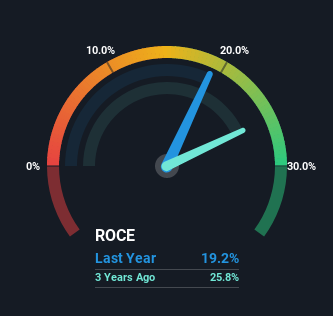
To find a multi-bagger stock, what are the underlying trends we should look for in a business? In a perfect world, we'd like to see a company investing more capital into its business and ideally the returns earned from that capital are also increasing. Ultimately, this demonstrates that it's a business that is reinvesting profits at increasing rates of return. So, when we ran our eye over Avenue Supermarts' (NSE:DMART) trend of ROCE, we liked what we saw.
Return On Capital Employed (ROCE): What Is It?
If you haven't worked with ROCE before, it measures the 'return' (pre-tax profit) a company generates from capital employed in its business. To calculate this metric for Avenue Supermarts, this is the formula:
Return on Capital Employed = Earnings Before Interest and Tax (EBIT) ÷ (Total Assets - Current Liabilities)
0.19 = ₹30b ÷ (₹171b - ₹15b) (Based on the trailing twelve months to December 2022).
Thus, Avenue Supermarts has an ROCE of 19%. In absolute terms, that's a satisfactory return, but compared to the Consumer Retailing industry average of 8.8% it's much better.
View our latest analysis for Avenue Supermarts

Above you can see how the current ROCE for Avenue Supermarts compares to its prior returns on capital, but there's only so much you can tell from the past. If you'd like, you can check out the forecasts from the analysts covering Avenue Supermarts here for free.
SWOT Analysis for Avenue Supermarts
- Earnings growth over the past year exceeded the industry.
- Debt is not viewed as a risk.
- Current share price is above our estimate of fair value.
- Annual earnings are forecast to grow faster than the Indian market.
- No apparent threats visible for DMART.
What The Trend Of ROCE Can Tell Us
While the returns on capital are good, they haven't moved much. The company has employed 217% more capital in the last five years, and the returns on that capital have remained stable at 19%. 19% is a pretty standard return, and it provides some comfort knowing that Avenue Supermarts has consistently earned this amount. Stable returns in this ballpark can be unexciting, but if they can be maintained over the long run, they often provide nice rewards to shareholders.
Our Take On Avenue Supermarts' ROCE
To sum it up, Avenue Supermarts has simply been reinvesting capital steadily, at those decent rates of return. And long term investors would be thrilled with the 146% return they've received over the last five years. So while the positive underlying trends may be accounted for by investors, we still think this stock is worth looking into further.
Avenue Supermarts does have some risks though, and we've spotted 1 warning sign for Avenue Supermarts that you might be interested in.
While Avenue Supermarts isn't earning the highest return, check out this free list of companies that are earning high returns on equity with solid balance sheets.
New: Manage All Your Stock Portfolios in One Place
We've created the ultimate portfolio companion for stock investors, and it's free.
• Connect an unlimited number of Portfolios and see your total in one currency
• Be alerted to new Warning Signs or Risks via email or mobile
• Track the Fair Value of your stocks
Have feedback on this article? Concerned about the content? Get in touch with us directly. Alternatively, email editorial-team (at) simplywallst.com.
This article by Simply Wall St is general in nature. We provide commentary based on historical data and analyst forecasts only using an unbiased methodology and our articles are not intended to be financial advice. It does not constitute a recommendation to buy or sell any stock, and does not take account of your objectives, or your financial situation. We aim to bring you long-term focused analysis driven by fundamental data. Note that our analysis may not factor in the latest price-sensitive company announcements or qualitative material. Simply Wall St has no position in any stocks mentioned.
About NSEI:DMART
Avenue Supermarts
Engages in the business of organized retail and operating supermarkets under the D-Mart brand name in India.
Flawless balance sheet with reasonable growth potential.

